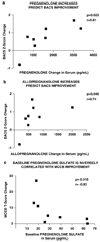Proof-of-concept trial with the neurosteroid pregnenolone targeting cognitive and negative symptoms in schizophrenia
- PMID: 19339966
- PMCID: PMC3427920
- DOI: 10.1038/npp.2009.26
Proof-of-concept trial with the neurosteroid pregnenolone targeting cognitive and negative symptoms in schizophrenia
Abstract
The neurosteroid pregnenolone and its sulfated derivative enhance learning and memory in rodents. Pregnenolone sulfate also positively modulates NMDA receptors and could thus ameliorate hypothesized NMDA receptor hypofunction in schizophrenia. Furthermore, clozapine increases pregnenolone in rodent hippocampus, possibly contributing to its superior efficacy. We therefore investigated adjunctive pregnenolone for cognitive and negative symptoms in patients with schizophrenia or schizoaffective disorder receiving stable doses of second-generation antipsychotics in a pilot randomized, placebo-controlled, double-blind trial. Following a 2-week single-blind placebo lead-in, patients were randomized to pregnenolone (fixed escalating doses to 500 mg/day) or placebo, for 8 weeks. Primary end points were changes in BACS and MCCB composite and total SANS scores. Of 21 patients randomized, 18 completed at least 4 weeks of treatment (n=9/group). Pregnenolone was well tolerated. Patients receiving pregnenolone demonstrated significantly greater improvements in SANS scores (mean change=10.38) compared with patients receiving placebo (mean change=2.33), p=0.048. Mean composite changes in BACS and MCCB scores were not significantly different in patients randomized to pregnenolone compared with placebo. However, serum pregnenolone increases predicted BACS composite scores at 8 weeks in the pregnenolone group (r(s)=0.81, p=0.022). Increases in allopregnanolone, a GABAergic pregnenolone metabolite, also predicted BACS composite scores (r(s)=0.74, p=0.046). In addition, baseline pregnenolone (r(s)=-0.76, p=0.037), pregnenolone sulfate (r(s)=-0.83, p=0.015), and allopregnanolone levels (r(s)=-0.83, p=0.015) were inversely correlated with improvements in MCCB composite scores, further supporting a possible role for neurosteroids in cognition. Mean BACS and MCCB composite scores were correlated (r(s)=0.74, p<0.0001). Pregnenolone may be a promising therapeutic agent for negative symptoms and merits further investigation for cognitive symptoms in schizophrenia.
Conflict of interest statement
Dr Marx has no compensation to disclose over the last 3 years. Dr Marx is a co-applicant on a pending US patent application on the use of neurosteroids for the treatment of central nervous system disorders. She is an unpaid scientific advisor and board member of NeuroScience Pharmaceuticals. Dr Keefe has received compensation from the following sources: Astra-Zeneca, Cyberonics, Gabriel Pharmaceuticals, Organon Pharmaceuticals, Otsuka, Pfizer, Saegis, Abbott, Acadia, BiolineRx, Bristol-Myers Squibb, Cephalo, Cortex, Dainippon Sumitomo Pharmaceutical, Eli Lilly, Johnson & Johnson, Lundbeck, Memory Pharmaceuticals, Merck, Orexigen, Sanofi/Aventis, Shering-Plough, Wyeth, and Xenoport. Dr Keefe is a contributor to a pending US patent application on the use of neurosteroids for the treatment of central nervous system disorders. Dr Keefe receives royalties for two of the cognitive test batteries used in this study, the BACS and the MATRICS Consensus Cognitive Battery. Dr Buchanan has received compensation from the following sources: Astra-Zeneca, GlaxoSmithKline, Janssen, Merck, Natixis Bleichroeder, Organon, Ortho-McNeil, Pfizer, Sanofi-Aventis, Solvay Pharmaceuticals, and Wyeth. Dr Hamer has received compensation from the following sources: Acadia, Allergan, Alpharma, Astra-Zeneca, Cenerx, Corcept, EnabledMD, Epix, Johnson & Johnson, Pfizer, Schwartz, Solvay Pharmaceuticals, Sanofi-Aventis, Takeda, and Wyeth. Dr Kilts, Dr Bradford, Dr Strauss, Dr Naylor, Dr Payne, Ms Leimone, Dr Dunn, Dr Porcu, Dr Morrow, and Mr Shampine have no compensation to disclose over the last 3 years. Dr Lieberman has received compensation from the following sources: Astra-Zeneca, Eli Lilly, Forest Laboratories, GlaxoSmithKline, Pfizer, Wyeth, Solvay Pharmaceuticals, Bristol-Myers Squibb, Janssen, and Repligen. Dr Savitz has received compensation from the following sources: Astra-Zeneca, Sanofi-Aventis, Janssen, and Pfizer.
Figures

Similar articles
-
Proof-of-concept randomized controlled trial of pregnenolone in schizophrenia.Psychopharmacology (Berl). 2014 Sep;231(17):3647-62. doi: 10.1007/s00213-014-3673-4. Epub 2014 Jul 17. Psychopharmacology (Berl). 2014. PMID: 25030803 Clinical Trial.
-
Pregnenolone as a novel therapeutic candidate in schizophrenia: emerging preclinical and clinical evidence.Neuroscience. 2011 Sep 15;191:78-90. doi: 10.1016/j.neuroscience.2011.06.076. Epub 2011 Jul 1. Neuroscience. 2011. PMID: 21756978 Review.
-
A randomized, placebo-controlled study investigating the nicotinic α7 agonist, RG3487, for cognitive deficits in schizophrenia.Neuropsychopharmacology. 2014 Jun;39(7):1568-77. doi: 10.1038/npp.2014.17. Epub 2014 Jan 27. Neuropsychopharmacology. 2014. PMID: 24549101 Free PMC article. Clinical Trial.
-
Add-On Pregnenolone with L-Theanine to Antipsychotic Therapy Relieves Negative and Anxiety Symptoms of Schizophrenia: An 8-Week, Randomized, Double-Blind, Placebo-Controlled Trial.Clin Schizophr Relat Psychoses. 2018 Spring;12(1):31-41. doi: 10.3371/CSRP.KARA.070415. Epub 2015 Jul 28. Clin Schizophr Relat Psychoses. 2018. PMID: 26218236 Clinical Trial.
-
Aripiprazole: a review of its use in schizophrenia and schizoaffective disorder.Drugs. 2004;64(15):1715-36. doi: 10.2165/00003495-200464150-00010. Drugs. 2004. PMID: 15257633 Review.
Cited by
-
In vitro and in vivo sigma 1 receptor imaging studies in different disease states.RSC Med Chem. 2020 Oct 8;12(2):154-177. doi: 10.1039/d0md00186d. eCollection 2021 Mar 4. RSC Med Chem. 2020. PMID: 34046607 Free PMC article. Review.
-
Celecoxib Adjunctive Treatment to Antipsychotics in Schizophrenia: A Review of Randomized Clinical Add-On Trials.Mediators Inflamm. 2016;2016:3476240. doi: 10.1155/2016/3476240. Epub 2016 Jul 25. Mediators Inflamm. 2016. PMID: 27524864 Free PMC article. Review.
-
Pleiotropic actions of allopregnanolone underlie therapeutic benefits in stress-related disease.Neurobiol Stress. 2019 Nov 27;12:100203. doi: 10.1016/j.ynstr.2019.100203. eCollection 2020 May. Neurobiol Stress. 2019. PMID: 31879693 Free PMC article.
-
Assessment of pharmacotherapy for negative symptoms of schizophrenia.Curr Psychiatry Rep. 2010 Dec;12(6):563-71. doi: 10.1007/s11920-010-0148-0. Curr Psychiatry Rep. 2010. PMID: 20821286 Review.
-
Pregnenolone sulfate as a modulator of synaptic plasticity.Psychopharmacology (Berl). 2014 Sep;231(17):3537-56. doi: 10.1007/s00213-014-3643-x. Epub 2014 Jul 6. Psychopharmacology (Berl). 2014. PMID: 24997854 Free PMC article. Review.
References
-
- Addington D, Addington J, Schissel B. A depression rating scale for schizophrenics. Schizophr Res. 1990;3:247–251. - PubMed
-
- Andreasen N. Scale for the Assessment of Negative Symptoms (SANS) Iowa City: University of Iowa; 1983.
-
- Azcoitia I, Leonelli E, Magnaghi V, Veiga S, Garcia-Segura LM, Melcangi RC. Progesterone and its derivatives dihydro-progesterone and tetrahydroprogesterone reduce myelin fiber morphological abnormalities and myelin fiber loss in the sciatic nerve of aged rats. Neurobiol Aging. 2003;24:853–860. - PubMed
-
- Barbaccia ML, Affricano D, Purdy RH, Maciocco E, Spiga F, Biggio G. Clozapine, but not haloperidol, increases brain concentrations of neuroactive steroids in the rat. Neuropsycho-pharmacology. 2001;25:489–497. - PubMed
Publication types
MeSH terms
Substances
Grants and funding
LinkOut - more resources
Full Text Sources
Other Literature Sources
Medical
Miscellaneous

